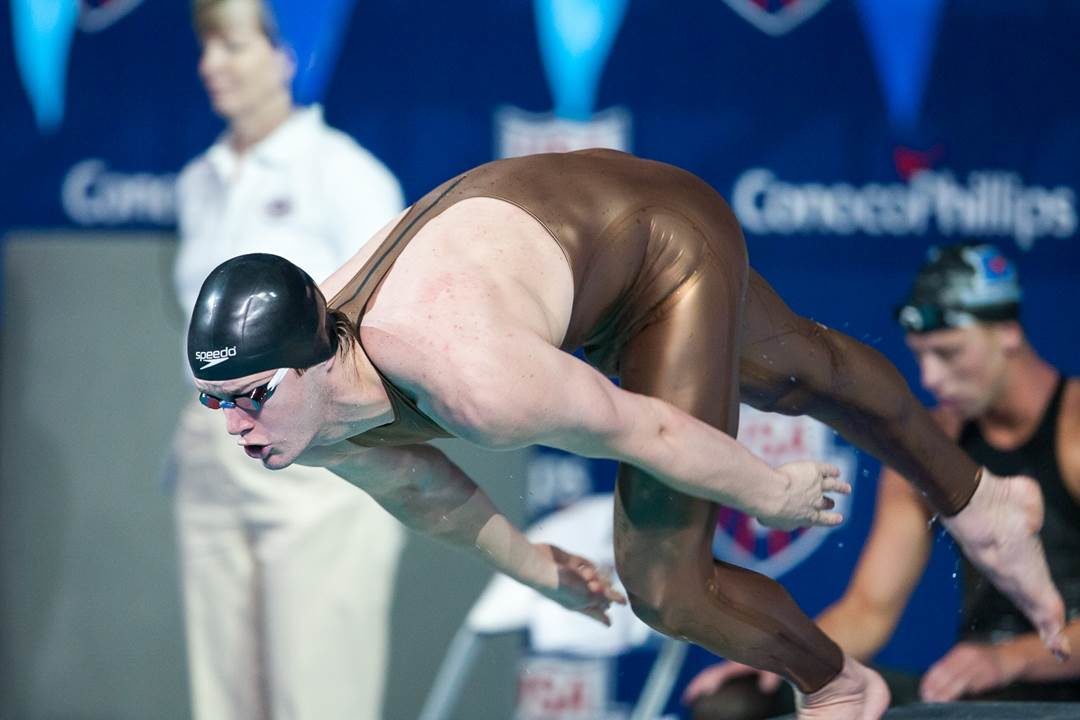
Nathan Adrian, 20, of Cal before the 100 free start. Adrian would win in a time of 48.0. July 10, 2009. (Photo courtesy: Tim Binning/TheSwimPictures.com)

Lara Jackson of Arizona following the 50 free final in which she placed third by 1/100th of a second. July 9, 2009. (Photo courtesy: Tim Binning/TheSwimPictures.com)

Tyler Clary of Michigan starts the 400 IM prelims. He would qualify first with a time of 4:11.29. His finals time of 4:06.96 to placed second behind Ryan Lochte. July 7, 2009. (Photo courtesy: Tim Binning/TheSwimPictures.com)

Amanda Weir of Swim Atlanta before the start of the 100 free championship final. Weir would place second in 54.03. July 11, 2009. (Photo courtesy: Tim Binning/TheSwimPictures.com)

Mark Gangloff helps Eric Shanteau with his suit following his victory in the 100 breaststroke. July 7, 2009. (Photo courtesy: Tim Binning/TheSwimPictures.com)

Alyssa Anderson of Arizona before the 200 fly championship final. July 10, 2009. (Photo courtesy: Tim Binning/TheSwimPictures.com)

Aaron Peirsol of Longhorn Aquatics starts the prelims of the 100 back in the full body Arena suit. July 8, 2009. (Photo courtesy: Tim Binning/TheSwimPictures.com)

Lacy Nymeyer of Arizona behind the blocks before the start of the 100 free championship final. July 11, 2009. (Photo courtesy: Tim Binning/TheSwimPictures.com)

Michael Alexandrov prepares for the start of the 100 breastroke championship final. July 7, 2009. (Photo courtesy: Tim Binning/TheSwimPictures.com)

Eric Shanteau breaks the 200 breastroke American record (2:08.43) in an otherwise sleepy Saturday morning prelims session. He would go on to break the record again in evening finals. July 11, 2009. (Photo courtesy: Tim Binning/TheSwimPictures.com)

Jimmy Feigen, 19, following a 21.92 prelim swim in the 50 free. July 9, 2009. (Photo courtesy: Tim Binning/TheSwimPictures.com)

Ryan Lochte swims the 200 back prelims in the full body Speedo LZR. July 11, 2009. (Photo courtesy: Tim Binning/TheSwimPictures.com)
Many thanks to SwimSwam contributor and swimming photo artist, Tim Binning, for creating this photo vault.

No Ricky Berens? Come on….
Ripped suits and 5 minute delays were clearly one of the most “visible” impacts of the rubber suits.
Stephen,
You ask some great questions. Think of the potential advantages here. By trapping those gasses, could that aid in boyancy?
I wonder if with the suits should be a rule against chilli beans before the events.Fart propulsion will be doping?
To see Dave Walters with the 100 free American record still makes me sick today!
Haha yeah he is good but not that good, hopefully adrian can take that down this summer. He was one of those guys like Paul biederman where the suits made a huge difference, I wonder what the difference for them is
Really? The only men’s LCM American record that’s been broken after the suit era is Lochte’s 2 IM, but somehow you’re offended by the fact that nobody has swam faster than Walters in the 100?
my real question however is far more significant.
if you fart in a rubber suit, where do all the bubbles escape? out your armpits?
heres my take on the whole notion of bringing the suits back. we didn’t see an imediate on slaught of records go down when the suits first came out. yeah some of that was technical innovations in the later models, but i think the greater cause is an increased understanding of how those suits improved performance. we didn’t know how to back load a race until several meets of wearing these suits. (this being the biggest improvement in the 200+ races) since then, we’ve learned alot more about swimming, a lot of it from the suits and thats why we see swims like Soni’s 200 br this summer or anything from Sun Yang
i don’t think we would see significant… Read more »
You get everyone to suit up in the rubber suit in Barcelona, and I can assure you WRs will be demolished.
In my opinion, the biggest impact the suits had on sport was a total demolition of what the realm of possibility was. Between 2000 and 2008 the world saw 2 or three sub 48.0 swims, and only a hand full under the 21.8 barrier. The suits broke down the mental wall and allowed athletes to see that there exist only the limitations they put on themselves. Athletes since 2010, in far less fabric than their 2007 counterparts are swimming times, across all disciplines, that would have seemed out of reach before the suits made them commonplace.
Anybody else curious what kind of times we would see if we were to bring back the suits, just for one meet? Would the effect be as dramatic as it was circa-2009, or have the gains we’ve made since then mitigated the suits’ effect? In other words, would the improvements in technique, training, athleticism show that the suits’ have diminishing marginal returns?
Put Morozov in a rubber body suit and you’ll have the World’s first sub-20 second 50m freestyle (short course metres) swimmer. That said, Leveaux and Bousquet have already swam 19.94 and 19.87 in relays at the 2008 Euro short course.
From what I understand of how the rubber suits worked, yeah, people would be swimming way faster. I don’t know if there’s any way to fully replicate what they did through improvements in technique or athleticism, that kind of added buoyancy and compression isn’t easily replaced.
And I mean, it’s only been four years. The sport hasn’t come that far.